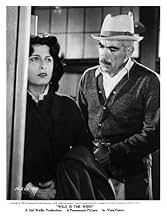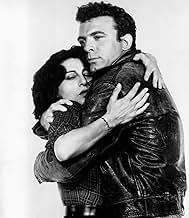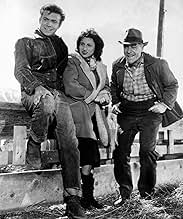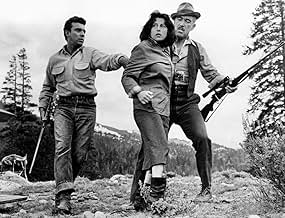NOTE IMDb
6,6/10
1,2 k
MA NOTE
Un éleveur immigré du Nevada fait venir une femme d'Italie pour être sa seconde épouse, mais lorsqu'il la néglige, elle se lie avec son assistant de confiance.Un éleveur immigré du Nevada fait venir une femme d'Italie pour être sa seconde épouse, mais lorsqu'il la néglige, elle se lie avec son assistant de confiance.Un éleveur immigré du Nevada fait venir une femme d'Italie pour être sa seconde épouse, mais lorsqu'il la néglige, elle se lie avec son assistant de confiance.
- Réalisation
- Scénario
- Casting principal
- Nommé pour 3 Oscars
- 2 victoires et 8 nominations au total
Fern Barry
- Party Guest
- (non crédité)
Franklyn Farnum
- Passenger at Airport
- (non crédité)
Ken Hooker
- Party Guest
- (non crédité)
Max Power
- Party Guest
- (non crédité)
Court Shepard
- Party Guest
- (non crédité)
Avis à la une
Along with her Oscar winning role in "The Rose Tattoo", this is another great acting job by Anna Magnanni. The story involves a love triangle and a very adult theme. Produced in 1957, I saw this movie on the AMC movie channel several years ago and quickly fell in love with it. Being Italian myself, I really enjoyed hearing it spoke often during the movie. Anna Magnanni actually sings at one point, and I might add very well! I have constantly been checking the Internet for news of it's release, but to no luck. Does anyone know where can one find a copy of this movie to purchase? It deserves to be on DVD, but I'll settle for a VHS copy at this point. Thank you very much.
An elemental film, starting with the title. Anna Magnani was a force of nature, so the setting in the rugged Nevada mountains is apt, for this highly melodramatic tale. The passions of the characters are paralleled by images of raging rivers, rearing wild horses, and sheep giving birth, to the thunderous chords of Tiomkin's score. Several years earlier Magnani won an Oscar for her performance in The Rose Tattoo, and in this film she again dominates the screen. One of the most touching scenes is a quiet one at the beginning of the film, when she makes a connection with her niece, sensitively played by Dolores Hart. Anthony Quinn is enjoyable in this, although tending toward overacting. Franciosa holds his own with the two powerhouses.
Cukor's "Wild is the Wind" seems to be a kind of tribute to Fellini's classic "La Strada." He made his film just a couple years later, and sets it up along very similar lines. He selects Antony Quinn, Zampano for Fellini, to be his male lead, Gino. And chooses the forceful Anna Magnani (Gioia) to equal Guiletta Masina's rather astonishing performance in the central role of Gelsomina in "La Strada."
Gino, the Nevada ranch owner, is the same kind of brutish, brooding hunk as is the strong man performer in "La Strada." They act in the masculine mode, determined, gusty, sometimes cruel, and in different senses, heroically alone. It is perhaps the poverty of the former and Gino's outsider status (Italian in Nevada) that open each up to change, and redemption. Each, however, is hardened against the actual woman--whoseservice he demands, and whose body he exploits--who offers that change.
Gioia, like her parallel, Gelsomina, is a replacement for a dead sister. Zampano purchases Gelsomina after his Rosa dies. Gino orders Gioia as a mail order bride to replace his wife who died after several desperate attempts to give him a child. Both women find themselves trapped in a feelingless, cold, abusive relationship, removed from human response and the natural world. They are owned--body and soul, and are, of course, interchangeable with their sisters.
But Gioia's resistance, like that of her predecessor, is central. Each woman is engaged, through a compelling range of small acts and facial expressions--they are FACES above all else--in a form of survival which doubles as opposition. What the man denies, they affirm, what he kills, they save. Each is strongly in touch with the needless suffering endured by humans and animals, and are sickened by the acts that cause it . And each is more bold than pleasing, more spirited than spiritual, and more troubling than tamed.
Both women have one or two male allies who bear some similarity. Bene (Tony Francioso) seems related to "La Strada"s tightrope walker (Richard Basehart): both men serving as alternative male's who have understanding and sympathy for these held women, and for the natural world they defend. They create space an breathing room--Bene's lust seems out of character. And then too each, in the end, leaves these women to the mercy of their oppressive situation. (Alberto, Gino's older brother, is perhaps a more practical ally than these two, however: it is his unusually direct and touching challenge to his brother that forces him to perceive Gioia as a person.)
All the major roles of La Strada are more convincing and consistent, and thus the ending is more powerful. Gino's redemption is also secured at a much lower cost than Zampano's, which has to do with the weaker script/plot than and not his less rigid nature. However "Wild is the Wind," given Cukor's Hollywood models and restraints, measures up quite well to Fellini's classic.
Gino, the Nevada ranch owner, is the same kind of brutish, brooding hunk as is the strong man performer in "La Strada." They act in the masculine mode, determined, gusty, sometimes cruel, and in different senses, heroically alone. It is perhaps the poverty of the former and Gino's outsider status (Italian in Nevada) that open each up to change, and redemption. Each, however, is hardened against the actual woman--whoseservice he demands, and whose body he exploits--who offers that change.
Gioia, like her parallel, Gelsomina, is a replacement for a dead sister. Zampano purchases Gelsomina after his Rosa dies. Gino orders Gioia as a mail order bride to replace his wife who died after several desperate attempts to give him a child. Both women find themselves trapped in a feelingless, cold, abusive relationship, removed from human response and the natural world. They are owned--body and soul, and are, of course, interchangeable with their sisters.
But Gioia's resistance, like that of her predecessor, is central. Each woman is engaged, through a compelling range of small acts and facial expressions--they are FACES above all else--in a form of survival which doubles as opposition. What the man denies, they affirm, what he kills, they save. Each is strongly in touch with the needless suffering endured by humans and animals, and are sickened by the acts that cause it . And each is more bold than pleasing, more spirited than spiritual, and more troubling than tamed.
Both women have one or two male allies who bear some similarity. Bene (Tony Francioso) seems related to "La Strada"s tightrope walker (Richard Basehart): both men serving as alternative male's who have understanding and sympathy for these held women, and for the natural world they defend. They create space an breathing room--Bene's lust seems out of character. And then too each, in the end, leaves these women to the mercy of their oppressive situation. (Alberto, Gino's older brother, is perhaps a more practical ally than these two, however: it is his unusually direct and touching challenge to his brother that forces him to perceive Gioia as a person.)
All the major roles of La Strada are more convincing and consistent, and thus the ending is more powerful. Gino's redemption is also secured at a much lower cost than Zampano's, which has to do with the weaker script/plot than and not his less rigid nature. However "Wild is the Wind," given Cukor's Hollywood models and restraints, measures up quite well to Fellini's classic.
Anthony Quinn, (Gino) plays the role as a Italian/American sheep rancher who loses his wife and he decides to send for his dead wife's sister, Giola, (Anna Magnani) from Italy. When Giola arrives Gino gives her all kinds of presents, but is not close to her and always calls her by his dead wife's name. As the months go by, Giola becomes unhappy and feels neglected and still remains unmarried even though Gino calls her his wife. Bene, (Anthony Franciosa) is Gino's son and he becomes romantically involved with Giola and they have some very torrid love scenes. In one scene you see a sheep giving birth which adds a great deal to the reality of this very down to earth film which was directed by the famous director, George Cukor. Anna Magnani gave an outstanding performance and was nominated for an Acamedy Award for her great role. Enjoy.
This "women's director" was also no slouch with men, and he helps Anthony Quinn to perhaps his best performance. Quinn often overacted, and here, as a hearty, swaggering, brutish sheep rancher who brings his dead wife's sister (Anna Magnani) over from Italy to marry, he easily could have resorted to his usual bluster. But it's a very shaded portrayal, with seemingly conflicting elements of roughness and tenderness that make sense in the end. Magnani is predictably great, even singing well, and Tony Franciosa, as Quinn's adopted son who forms an O'Neill-like triangle (it does feel like "Desire Under the Elms," as another commenter noted), is excellent. The outdoorsiness and earthiness (you even see a lamb born, before your boggled eyes) are un-Cukorlike, but he handles them confidently; and while the symbolism gets a little heavy and Dmitri Tiomkin's music is a bit intrusive, it's an effective family melodrama with a beautifully underplayed fadeout.
Le saviez-vous
- AnecdotesThe only film that year nominated for Best Motion Picture Drama at the Golden Globes, and not Best Picture at the Academy Awards.
- ConnexionsFeatured in The Hollywood Collection: Anthony Quinn an Original (1990)
- Bandes originalesWild Is the Wind
Music by Dimitri Tiomkin
Lyrics by Ned Washington
Performed by Johnny Mathis
(A Columbia Records Artist)
Meilleurs choix
Connectez-vous pour évaluer et suivre la liste de favoris afin de recevoir des recommandations personnalisées
- How long is Wild Is the Wind?Alimenté par Alexa
Détails
- Durée
- 1h 54min(114 min)
- Couleur
- Rapport de forme
- 1.85 : 1
Contribuer à cette page
Suggérer une modification ou ajouter du contenu manquant






























